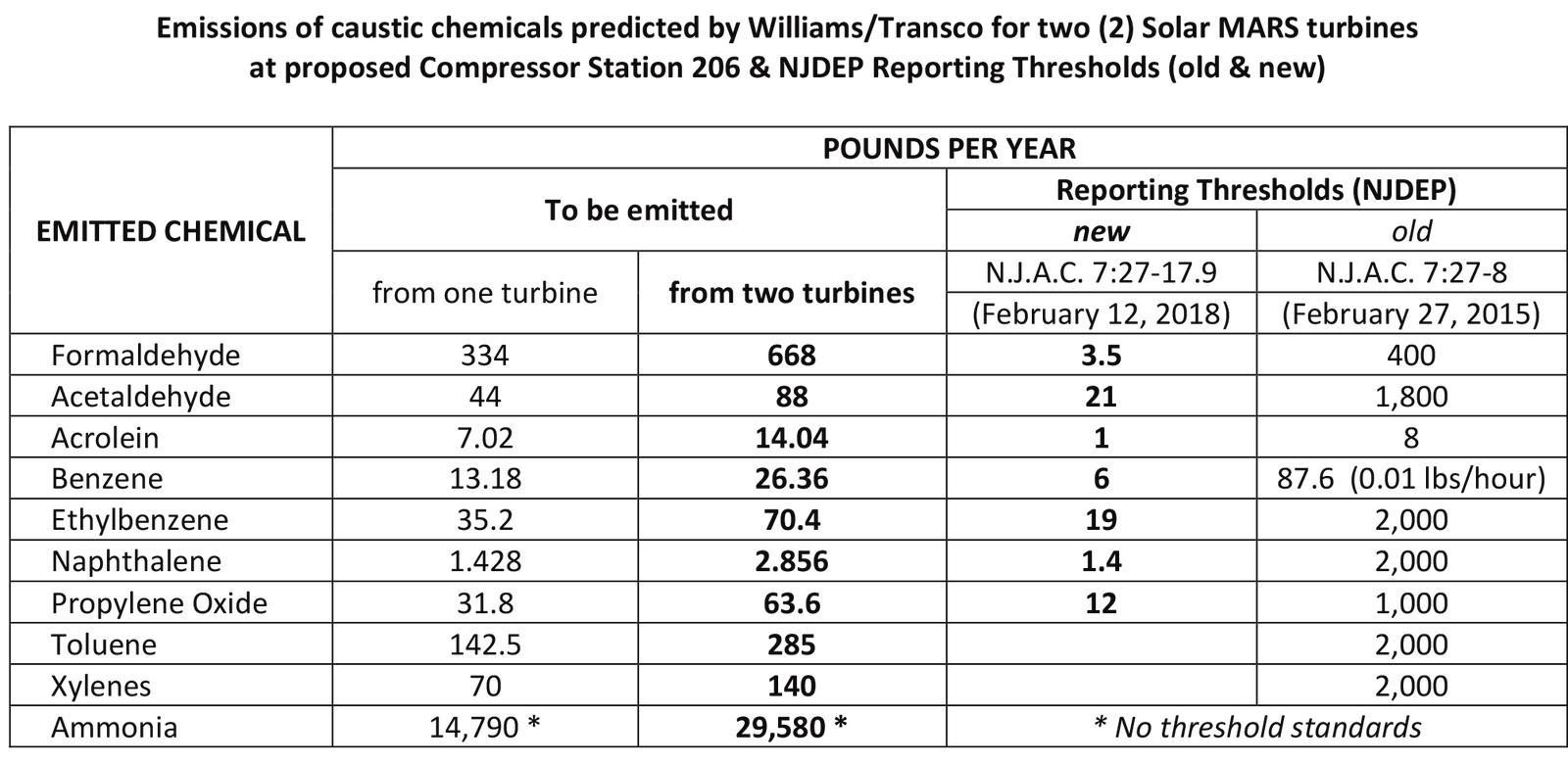In Your Opinion: Proposed Compressor Station Health And Safety Risk
Submitted by Franklin Township Task Force on Compressor Station 206 & NESE’s Steering Committee.
Series Issue 2: Compressor Stations release toxic chemicals into the air. These are known to impact health.
Compressor Station 206 is proposed to be a 32,000-horsepower gas-fired unit that will emit formaldehyde, benzene, ammonia, and other toxic chemicals. Williams/Transco decided that they could not replace this with electric compressor units, and FERC decided that there was no need to complete a Health Impact Assessment in the area. Some concerns about this are noted in the information below as well as on our website, www.scrap-NESE.org.
People who live near compressor stations experience skin rashes, gastrointestinal, respiratory, neurological, and psychological problems. Air samples show elevated levels of many toxics, including volatile organic compounds, particulates and gaseous radon. Many cause health issues including cancer, childhood leukemia, birth defects, developmental delays, immunological disorders (including asthma and allergies) & increased risk for heart attacks, strokes, neurological issues, lung diseases, sleep issues, breathing disorders and kidney disease.
Within a 2-mile radius around natural gas compressor stations and metering stations, Dr. Wilma Subra has documented the following complaints by people in Human Health Impacts Associated with Chemicals and Pathways of Exposure for the Development of Shale Gas Plays:
- 71% experienced respiratory impacts
- 58% experienced sinus problems
- 55% experienced throat irritations
- 52% experienced eye irritations
- 48% experienced nasal irritations
- 42% experienced breathing difficulties or vision impairment
- 39% experienced sleep disturbances
- 39% experienced severe headaches
The pollutants from gas infrastructures increase ozone, which has known serious respiratory and cardiac health effects. See: https://www.epa.gov/ozone-pollution/health-effects-ozone-pollution
Eleven counties in NJ already get failing grades for ozone, and asthma rates are climbing. See: http://www.nj.com/weather/index.ssf/2017/04/these_counties_have_the _worst_air_pollution_in.html.
Areas surrounding compressor stations are known in the gas industry as “sacrifice zones” – for good reason. For example, in October 2014, a notice of violation and proposed civil penalty was issued against Spectra Energy for excessive emissions from a compressor station.
In their report about pollution and health impacts from 18 NY compressor stations, P.N. Russo & D.O. Carpenter write, “Air pollution from compressor stations can easily travel 10 miles or more before returning to ground level.” (12 October 2017). Health Effects Associated with Stack Chemical Emissions from NYS Natural Gas Compressor Stations: 2008-2014. Another useful reference showing health impacts for those around compressor stations is: Southwest Pennsylvania Environmental Health Project’s 2015 Summary on compressor stations and health impacts that can be found at:
Natural gas in the Marcellus Shale region of Pennsylvania is highly radioactive. Radon has a short half-life of 3.8 days, and then the byproducts of its decay are lead (half-life of 22.6 years) and polonium (half-life of 138 days). Lead can cause neurologic and hematologic toxicity, and polonium can cause cancer or death.
Federal and state standards like the National Ambient Air Quality Standards (NAAQS) are not adequate for protecting our health. The FERC has said that they do not believe it is important to conduct a Health Impact Assessment for people around the proposed compressor station. However, the NAAQS reflect what, over a region & over time, are deemed to be safe population-wise. This is very different than what is safe at residences or places of worship close to compressor stations, and increased illnesses and death have been correlated with long-term exposure to particulate matter (PM 2.5 or 10) at levels that are well below these “safe” levels. – Some reference studies are on our website, www.scrap-NESE.org.
NJDEP now has more stringent standards for air pollution (in effect February 2018). The NESE Air Pollution Control Preconstruction Permit and Certificate to Operate Construction of a New Source was issued on September 7, 2017 (under the old thresholds). Look at the differences in the “reporting thresholds” below and how Compressor Station 206 will emit chemicals that are over the limits said to protect our health.
Other issues:
- Yearly reports by Williams/Transco to NJDEP do not protect us from the health risks of compressor station emissions.
- There is no requirement to have air quality monitoring directly at the site of a compressor station.
- Natural gas pipelines are cleaned and inspected with a Pipeline Inspection or Intervention Gauge/Gizmo/Gadget, called PIGs. These devices remove pipe film, black powder, bacteria, scale and sludge. The storing and eventual disposal of this toxic waste is not reported in applications for natural gas pipelines with facilities like compressor stations.
The health of your family and friends depends on your action. Though there is no single solution for air pollution challenges, now is NOT the time to continue approving fossil fuel projects like the Northeast Supply Enhancement Project. We must continue to support strong actions, public policies and smart growth that will reduce the risks of air pollution to keep our local air and water clean.
What can you do?
1. Tell the NJDEP that you want them to (1) hold public hearings (“fact-finding meetings”) and (2) deny the new water permit applications for the NESE Project.
A. See the attached letter, add your personal information at the end, and send it, along with any written comments, to the NJDEP people listed below. You can either email it by August 3 or mail the completed letter by August 1.
Send emails of letters to:
Commissioner@dep.nj.gov
Ruth.Foster@dep.nj.gov
Matthew.Resnick@dep.nj.gov
Christopher.Jones@dep.nj.gov
Mail letters to:
Catherine R. McCabe, Commissioner
NJ Department of Environmental Protection
401 East State Street
7th Floor, East Wing
PO Box 402
Trenton, NJ 08625-0402
Ruth W. Foster, PhD., P.G., Acting Director
NJ Department of Environmental Protection
Office of Permit Coordination and Environmental Review
401 East State Street, PO Box 420
Trenton, NJ 08625
Bureau of Urban Growth & Redevelopment – Division of Land Use Regulation
501 East State Street, 2nd Floor
PO Box 420 – Mail Code 501-02A
Trenton, NJ 08625-0420
Attn.: Matthew Resnick & Christopher Jones.
You can also sign the online petition letter to NJDEP provided by Food & Water Watch by going to:
https://secure.foodandwaterwatch.org/act/stop-transco-pipeline-and-compressor-station
2. Tell your State Representatives to support Joe Danielsen’s Resolution AR164, and encourage your State Senators to do a companion resolution opposing the NESE Project.
3. Tell your local, state and federal officials about your concerns with the NESE Project and ask them to act to protect you.
4. Write comments to FERC about your concerns.
5. Go to www.scrap-NESE.org for information about the NESE Project, sample comments, the letter to NJDEP, and actions to take.












































.png)










